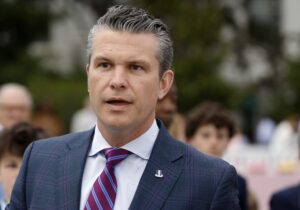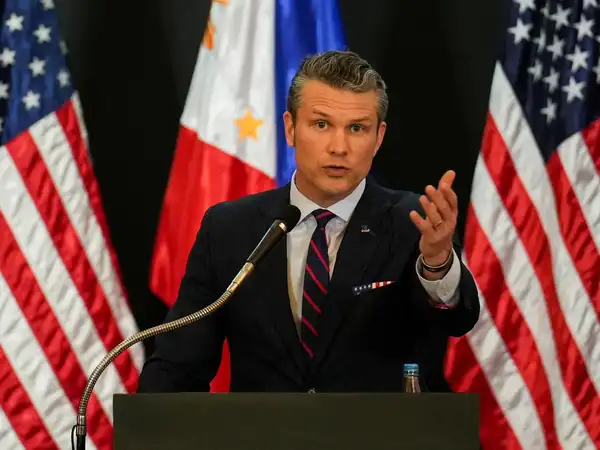
In a press briefing that captured national attention, White House Press Secretary Karoline Leavitt faced pointed questions about President Donald Trump’s confidence in Secretary of Defense Pete Hegseth. The exchange, which unfolded against a backdrop of reported tensions between Hegseth and Pentagon officials, underscored the administration’s resolute backing of the controversial defense secretary. Leavitt’s forceful reaffirmation of Trump’s support has sparked renewed debate about Hegseth’s tenure and the broader dynamics within the Department of Defense.
A Direct Question, A Steadfast Response
On Monday morning, Leavitt was asked directly whether President Trump still had confidence in Hegseth, prompted by what some media outlets described as a “Signal chat” raising doubts about his position. Her response was unequivocal. “President Trump stands strongly behind Secretary of Defense Pete Hegseth,” Leavitt declared, dismissing the reports as “fake news” and emphasizing that Trump’s optimism and confidence in Hegseth had never wavered. She attributed the rumors to opposition within the Pentagon, stating, “This is what happens when the entire Pentagon is working against you, and working against the monumental change you are trying to implement.”
Leavitt’s remarks echoed earlier statements she made in December 2024, when similar speculation about Hegseth’s standing surfaced. At that time, she asserted that Trump stood by Hegseth “100%,” a sentiment reiterated across multiple platforms by Trump’s allies. The consistency of this message suggests a deliberate strategy to project unity and resilience in the face of internal and external criticism.
Hegseth’s Appointment: A Bold Choice

Pete Hegseth, a former Fox News host and decorated Army veteran, was appointed Secretary of Defense following Trump’s return to the White House in January 2025. His selection was seen as a bold move, aligning with Trump’s pledge to shake up the federal government and challenge entrenched bureaucracies. Hegseth’s outspoken conservative views and his advocacy for a leaner, more agile military resonated with Trump’s base but raised eyebrows among career Pentagon officials and some lawmakers.
Hegseth’s tenure has been marked by ambitious proposals to streamline defense operations and prioritize readiness, but it has also been plagued by controversy. Reports of friction with senior Pentagon leaders have fueled speculation about his effectiveness. Critics argue that Hegseth’s lack of traditional government experience and his polarizing media background have hindered his ability to navigate the complex defense establishment. Supporters, however, view him as a reformer battling a resistant “deep state” within the military-industrial complex.
Pentagon Pushback: A Clash of Visions
Leavitt’s assertion that “the entire Pentagon is working against” Hegseth points to a deeper rift between the administration’s vision and the institutional culture of the Department of Defense. Sources familiar with the situation describe a Pentagon wary of rapid policy shifts, particularly those perceived as politically driven. Hegseth’s push for reforms, including reductions in administrative overhead and a focus on combat readiness, has reportedly met resistance from career officials accustomed to incremental change.
This tension is not unique to Hegseth’s tenure. Previous defense secretaries under Trump, such as James Mattis, also faced challenges balancing the president’s directives with the Pentagon’s operational realities. However, Hegseth’s high-profile media presence and his alignment with Trump’s populist agenda have amplified the scrutiny. “The Pentagon is a massive institution with its own momentum,” said Dr. Elizabeth Sanders, a defense policy expert at Georgetown University. “A secretary like Hegseth, who comes in with a mandate for disruption, is bound to face pushback.”
The Role of “Fake News” in Shaping Narratives
Leavitt’s dismissal of the Signal chat reports as “fake news” reflects a broader strategy employed by the Trump administration to counter unfavorable media coverage. The term, popularized by Trump during his first term, has become a rallying cry for supporters who view mainstream media as biased against the administration. By framing the Hegseth rumors as fabricated, Leavitt sought to undermine their credibility and shift the narrative toward Trump’s unwavering leadership.
Social media platforms, particularly X, have played a significant role in amplifying this message. Posts from prominent Trump allies, including Charlie Kirk and the official Trump War Room account, have echoed Leavitt’s defense of Hegseth, garnering thousands of engagements. One post described Leavitt’s response as “forceful” and praised Trump for standing firm against “the latest round of fake news.” These coordinated efforts highlight the administration’s adeptness at shaping public perception in real time.
Hegseth’s Challenges: Beyond the Pentagon
While Leavitt’s remarks focused on Trump’s support, they also drew attention to the broader challenges facing Hegseth. In recent weeks, media outlets have reported on anonymous sources questioning his leadership, with some suggesting that Trump was considering replacements. The Daily Mail, citing an unnamed source, claimed that Trump’s confidence in Hegseth was waning—a claim Leavitt swiftly refuted.
Hegseth’s past has also come under scrutiny. His time as a Fox News commentator, where he frequently criticized Pentagon policies, has been cited by detractors as evidence of his divisive approach. Additionally, allegations from his personal life, including a 2017 incident that was later dismissed, have resurfaced in some reports, though they have not gained significant traction. Supporters argue that these criticisms are part of a concerted effort to discredit a loyal Trump appointee.
The Bigger Picture: Trump’s Loyalty and Governance Style
Leavitt’s press briefing underscores a defining feature of Trump’s leadership: his fierce loyalty to chosen allies, even in the face of adversity. This approach has both galvanized his base and polarized observers. By standing by Hegseth, Trump signals his commitment to his agenda and his willingness to confront institutional resistance head-on. “Trump values loyalty above all else,” said political analyst David Ramirez. “Hegseth’s alignment with Trump’s vision makes him indispensable, regardless of the noise.”
This loyalty, however, comes with risks. Persistent reports of discord within the Pentagon could erode public confidence in the administration’s ability to manage national security effectively. Moreover, Hegseth’s ability to implement his reforms may hinge on his capacity to build coalitions within the defense establishment—a task that, thus far, appears daunting.
Public and Political Reactions
The public response to Leavitt’s remarks has been mixed, reflecting the polarized state of American politics. On X, conservative commentators have rallied behind Hegseth, portraying him as a patriot under attack by entrenched elites. “Karoline Leavitt just shut down the fake news narrative,” wrote one user, garnering widespread support. Conversely, critics have questioned whether Trump’s unwavering support for Hegseth prioritizes political loyalty over competence.
On Capitol Hill, reactions have been more measured. Some Republican lawmakers, particularly those aligned with Trump, have praised Hegseth’s efforts to reform the Pentagon. Others, including moderates, have expressed concern about the reported tensions, though few have called for his removal publicly. Democrats, meanwhile, have seized on the controversy to criticize Trump’s broader national security strategy, arguing that his appointments prioritize ideology over expertise.
What Lies Ahead for Hegseth

As Hegseth navigates his role, the coming months will be critical. His ability to advance Trump’s defense priorities—such as modernizing the military and countering global threats—will depend on his capacity to manage internal dissent and build support among key stakeholders. The administration’s success in framing the Pentagon’s resistance as evidence of Hegseth’s reformist zeal may bolster his position in the short term, but sustained progress will require tangible results.
For now, Leavitt’s forceful defense has bought Hegseth time and reaffirmed Trump’s commitment to his vision. Whether this support will translate into lasting change remains an open question. As one Pentagon insider put it, “Hegseth has the president’s ear, but the Pentagon has its own rhythm. Something’s got to give.”
Conclusion
Karoline Leavitt’s press briefing on April 21, 2025, was more than a defense of Pete Hegseth—it was a declaration of the Trump administration’s resolve to confront institutional resistance and advance its agenda. By standing “100%” behind Hegseth, Trump has doubled down on his commitment to transformative change, even at the cost of internal strife. As the nation watches, the outcome of this clash between loyalty and bureaucracy will shape the future of the Department of Defense and the broader trajectory of Trump’s second term.